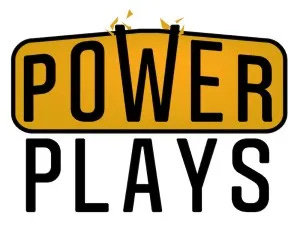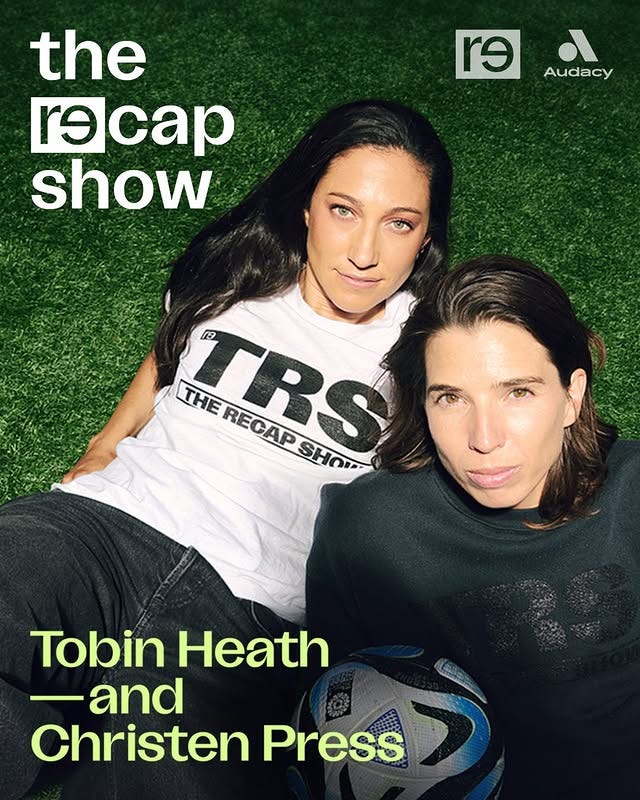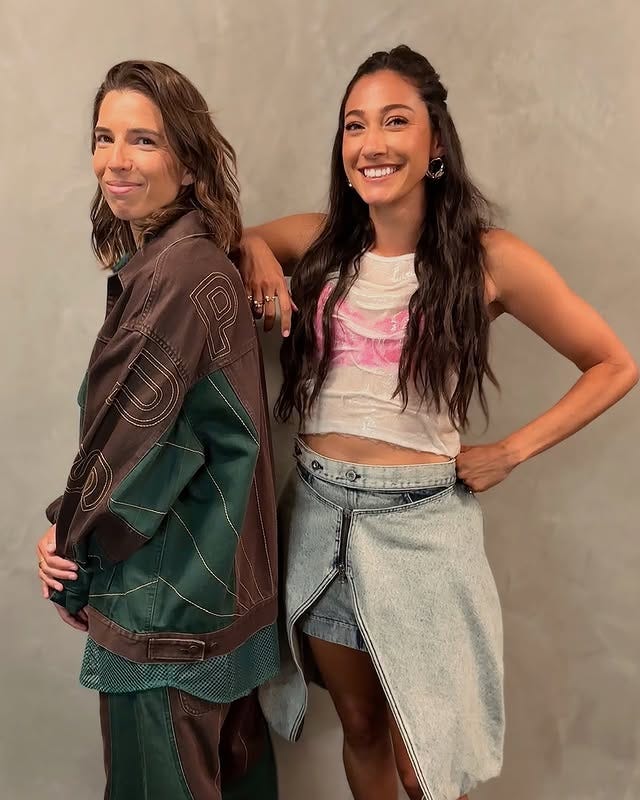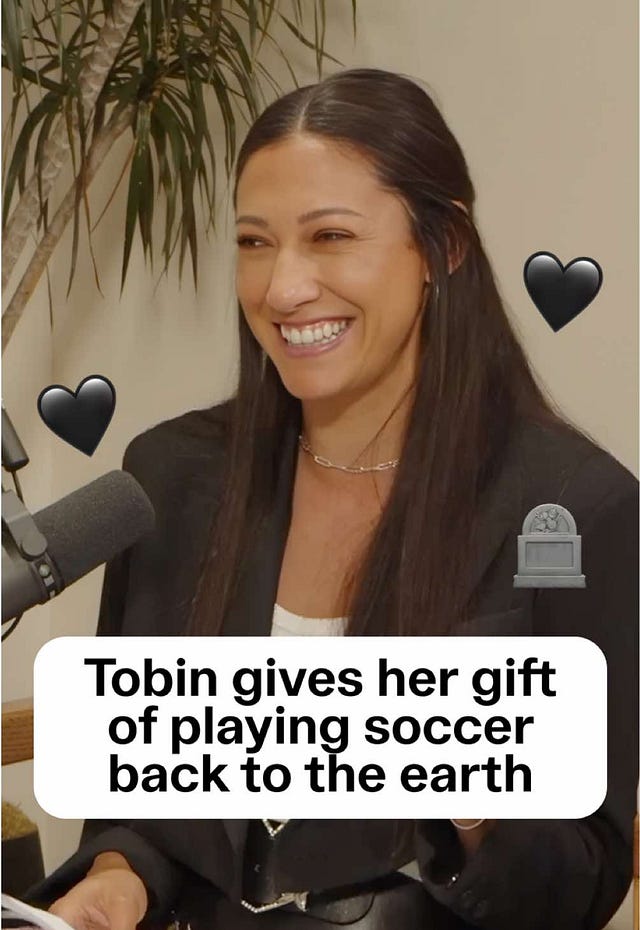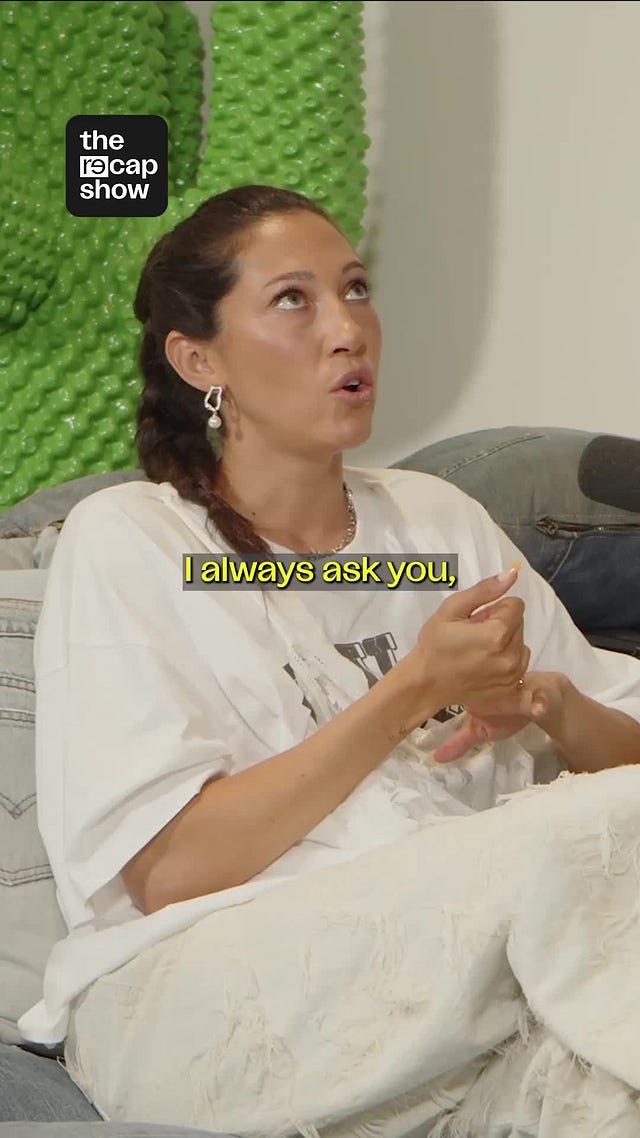Christen Press on grief, gal culture, and going public with 'Preath'
"We don't like following all the rules."
Hi friends!
If you’re a subscriber to this newsletter, I’m going to assume you have some familiarity with the RE—CAP show, the podcast hosted by USWNT legends and married couple (!!) Christen Press and Tobin Heath.
I tend to be skeptical about athlete podcasts, which often feel cookie-cutter and detached. But the RE—CAP show has become one of my must-listens. The show has been especially on a roll this summer. During Pride month in June, Heath and Press got candid about the pressure and privilege of being “Preath” — which is the nickname fans gave the couple about a decade ago, when online speculation about the nature of their relationship began. Considering how private the couple have been over the years, the episode was a revelation, especially since they both clearly had a different experience with the public nature of their partnership. I also loved their episode on “Gayngel City FC”, which featured three of Press’s gay teammates on Angel City FC talking about their sexuality and what Angel City’s Pride game meant to them, and made me think more critically about what athletes are dealing with behind the scenes.
But perhaps their most impactful episode was the one last month where Heath officially announced her retirement after three years away from the game due to an injury. It was truly the most raw, inspirational, and agonizing account I’ve heard any athlete share about walking away from their sport.
Given all of this, I was absolutely ecstatic last month when had a chance to talk with Press one-on-one. We dove deep about how and why she and Heath built the RE—CAP show, how the podcast has impacted their relationship, grieving in community, the power of "gal culture," their exciting new partnership with Audacy, and much, much more.
Truly, Press was just as thoughtful and sincere as she presents, and I absolutely know you all are going to love reading through our conversation1 *almost* as much as I loved having it. (I AM SO EXCITED TO SHARE THIS!!)
Ready for this exclusive treat??? Okay. Let’s do this.
Power Plays: I'm just the biggest fan of your podcast. I mean that genuinely—it's become one of my go-to listens. My perception of you and Tobin had always been that you're pretty private people. So what went into deciding to launch a media company with you and Tobin at the forefront, on camera and on mic? How did that decision come about?
Christen Press: Well, I think your initial impression was correct. (Laughter) Tobin and I have both had different individual relationships with the media, but both of us got to a place where we really wanted to have a direct and authentic relationship with our community that sometimes cameras, brands, and other businesses and agendas blur.
I used to always say that every single time you get your photo taken, it feels like you've lost a little piece of your soul, and then you have to go out and search and find it. That feeling of disembodiment happens because you start to think about yourself through the eyes of the audience, and that's really what led us to be what appeared to be private—or really was private.
What was really cool about starting a media division and starting the RE—CAP show was that the number one intent was to not have that disembodiment. The intent was, because we own this business, there is no other agenda we have to push. Because this is our show, we get to edit it, and if we don't like how something sounds or something comes out, we actually have control.
“Every single time you get your photo taken, it feels like you've lost a little piece of your soul, and then you have to go out and search and find it.”
What I think it's allowed us to do is be really, really honest and candid in a way that is pretty rare, at least for people who are starting out as niche or small as us. Being able to do that from the get-go allowed us to pull back the curtains and show our community what it's really like to just sit on the couch and talk to us.
We were really inspired by early conversations of us at home and the types of things that Tobin and I just talked about. I really care about social dynamics, power imbalances, culture, and political social movements, and how sports affects those things. She deeply cares about football. A lot of our conversations would be at this intersection point.
We said, "Hey, let's try having these conversations with experts, with really cool people, and let other people into our lives in that way." I think it's been really cool because we did have fear too. It was like, "Okay, let's try this, but maybe it's going to feel awful." And it feels awesome. Everything that kept us away from the camera before has really dissolved in this new framework we've built, and it allows us to feel really, really close to the community that we're building in women's soccer, and have two-way conversations with them.
PP: A few years into the RE—CAP show, what's been the hardest part, and what’s been the most surprising part?
CP: I think the hardest part is the least surprising thing, which is me balancing my schedule and going to practice. While I said we built this amazing, authentic space—which we have—it's still very draining. You still give a lot to it. I give a lot to Tobin, I give a lot to the audience, and I have to figure out how to recover and have boundaries and be able to prioritize my job and my first love and my number one priority, which is football.
I think the most surprising thing about it is how it's pushed Tobin and I’s relationship along. In letting people into our lives, it's really shifted a lot for us and what it means to us to be role models or be in the public eye. It pushed Tobin and me to be vocal about our relationship and share different parts of ourselves with the community. I don't think that would have ever happened or been possible without TRS.
PP: Let’s talk about the "Preath" episode when you guys finally really opened up. I found a lot of the things you talked about made me think so differently about what it is to have your relationship scrutinized. Something Tobin in particular said, or maybe it was you, was this quote I wrote down: "It's hard when everyone wants labels, and you don't necessarily have them yourself." What made you decide to finally open up this Pride Month and share bits and pieces of that with the audience?
CP: The episode was really special. It was definitely the most we've ever talked about us. I thought what was really authentic was how much Tobin really struggled with that — especially early on when we needed space for ourselves, to already have expectations on us was really tough.
The main thing that we like to convey—and I think we'll continue to do so—is we don't like following all the rules. We don't like prescribing to things just because that's how they've always been. When you have expectations on you, and you have these concepts of what it looks like to be in love, what it looks like to be in a healthy relationship—if you're seen out with somebody else, "Oh my gosh, are you cheating?"—it's just a crazy level of patriarchal ideation of what a relationship is supposed to look like. Tobin and I really need space to be able to be creative and re-imaginative in what our love looks like, and that's why I think it grows and blossoms and moves so beautifully, because we leave that space for it to be inquisitive.
The episode—how we got to feel like we could do it—was a lot of the same thing that I said about our show and the way we've been able to claim our own voice. Sometimes the reason you don't want to talk about your relationship is because it's just going to feed those rumors. People aren't going to get the full picture, and they're going to say, "Well, she said this, and I don't understand." But on our podcast, we got to explain, and we also got to disagree in a way that there's not a lot of space for.
“Tobin and I really need space to be able to be creative and re-imaginative in what our love looks like, and that's why I think it grows and blossoms and moves so beautifully, because we leave that space for it to be inquisitive.”
What was expressed by Tobin was, "This was really hard for us, and I don't think it's fair that we have these expectations on us." And I said something like, "Well, also representation is important, and I felt like we meant a lot to the queer community." We went back and forth. I feel like that nuance is lost often in other forms of media and other moments that we could have shared about our relationship. It's more like a beautiful photo shoot of a wedding and these epic images and this "happily ever after" story, and that we never want to create, because it's just not true for anyone.
PP: How did you even make it through the Tobin retirement episode? That was so emotional and beautiful. At one point you said, "There's such beauty in trauma," and I could not agree with that more, but I find a lot of people don't see that.
CP: I've always had this brooding artist kind of thing. I really like sad movies. I really like sad songs. I think that's where I relate the most. I think I was kind of an emo adolescent—it really takes me there.
I remember when Tobin first got told she might never play soccer again, and she ended up coming back for the Olympics. She was like, "I don't want to come back halfway. I don't want to try and fail." I remember being like, "But what's more beautiful than giving your all to something and failing?" That level of vulnerability and rawness—we're all so uptight, we're all so embarrassed and afraid to lose, and I feel like we miss out on the full human condition, which is just giving everything that you can. Sometimes you make it and sometimes you don't. I really find that so interesting.
I don't need my life to be all happy all the time, but I want to live the full human condition. Definitely going through this in a public way with Tobin was part of that. People think grief is like, there's an amount of grief, and you just have to process it, and then you're on the other end—like it's a bucket of water. But really, grief is a well. When the grief comes out, often it's filled with more and new grief.
Tobin's been doing a beautiful job in her own life of facing all of her demons and going through what really has been a death and a rebirth. She's done that with me, with her family, with her closest friends, in a way that I think takes so much courage, because her identity in life is so wound up in football in the most beautiful way.
We had this moment where she really accepted it and talked to me about it. We cried about it. We went through the grief. We were processing it—we weren't running from our emotions. Then I saw these big changes in Tobin. I saw her taking opportunities, starting with the World Sevens Football tournament, going to FIFA for a month to sit on the technical committee. A year ago she was rehabbing, still saying, "I'm going to play again," and so she wasn't taking these opportunities. I fell into the "Oh, we're on the other side of it. This is Tobin 2.0."
What happened when we decided to announce her retirement on the RE—CAP show was the realization of how many layers and how infinite the grief will be and is. This whole other shedding happened when she shared it publicly. If you know Tobin, you know she's like, "I don't want a retirement game. I don't want all that attention. I didn't play soccer for anyone but me." And yet here she is publicly sharing something that she has long come to terms with, with the world, and grieving and grieving—because we live in community. We do not live in isolation.
"People think there's this specific amount of grief, and you just have to process it, and then you're on the other end—like it's a bucket of water. But really, grief is a well."
Other people having the opportunity—her family, her friends, her teammates and her fans—to grieve the end of her career, to celebrate the beauty of her career, it affects you, and it's very emotional. I felt honored that I got to play facilitator and create a moment where Tobin felt safe enough to open up to the world. It almost felt cozy and safe in that room, as if there wasn't the world on the other side of the camera.
The hardest part for me is that she didn't want to watch it. She usually does all the editing and all the notes—we have a full team of editors who are amazing, but she does all the notes for both of us. I watched that episode four times because I was so afraid we could get it wrong and she would be so embarrassed. She was crying so much, she was snorting. We didn't need that on camera. So I had the task of making sure that her heart was protected in what the final product was, and we couldn't have been happier with how the team pulled it all together.
PP: It was incredible. I do a sports podcast with Slate, and I said on there that I think it's the most raw and authentic I've ever heard any athlete be about the retirement journey. Once again—and I'm not one to gas people up, I'm not just saying this—but what you guys have created makes me think about things differently. That's really a gift. That doesn't happen often in this space.
CP: That's really meaningful, because I think that's what we wanted. I mentioned before that we give a lot—and I don't say that like, "Oh, woe is me"—but it takes a lot to sit in a room for two hours and cry with your wife so that she could share this moment with the world. That's the point. The point is for everyone to have the opportunity then to be inquisitive and wonder why, and find the pieces of resonance. I'm really, really proud and happy to hear you say that.
PP: Define "gal culture."
CP: The gals! In sports, we often say, "Come on, girls," and "Let's go girls." You start playing soccer when you are a girl, and it always felt wrong to call us girls when we were grown-ass women. At one point we were like, "F it, we can't say, 'Let's go, women,'" and "ladies" is the worst. So at one point on the U.S. Women's National Team, we were like, "We're the gals. Let's just own it."
It's kind of funny, because "gals" is a really old-timey word, but I think because it was a little antiquated, it gave us space to redefine it. It was really the precipice of Tobin's inspiration for starting a media division.
Both Tobin and I had the privilege of playing on the U.S. Women's National Team for over a decade, and that locker room was the most powerful and magical place that I've ever experienced, because I got to be around 20-plus women that were unapologetic and brave. We fought, and we took up space, and we didn't shy away from the hard things, and we were raw and vulnerable in a way that society really discourages women from being—largely, and definitely publicly.
I had this feeling that I'm a changed woman because I was around such women. When it comes to the culture of the U.S. Women's National Team, that's what it is. In elite women's sports, often the women outnumber the men, and there's not very many jobs where there's gender separation, so you just have so many women around you. The culture of the U.S. Women's National Team was winning and unafraid and unashamed, unapologetic, and a little brass and just like—this feeling of "I'm going to eat my first child to be here." It was a little nasty, like when women shy away from wanting to be the best or wanting to have money, and you're like, "Well, I'm doing it for the next generation," but it was like, "No, we're doing it because we deserve to get paid. Full stop. Because this is our job and we deserve to get paid."
That type of attitude is transformative to see and be around. That is how I define gal culture, and what we try to do in the by bringing in awesome guests and trying to share that locker room feeling with the world is to show different types of gals, different types of people being different types of ways that you don't often get on television.
That's the spirit of gal culture. It is for everyone. It is inclusive. When you think of bro culture, bro culture's for the bros, but gal culture is for everyone. That's the difference. When you are creating things for and by gals, you think about that at the very, very beginning.
“When you think of bro culture, bro culture's for the bros, but gal culture is for everyone. That’s the difference.”
PP: It's been such a big month for you all, with the retirement news and some very personal shows. Then there's this big announcement—you get acquired by Audacy. What does that new partnership mean? And what do you feel like that says about where the media is going, and the power in creating your own lane?
CP: We're extremely excited about the Audacy partnership. For us, it really represents TRS 2.0. We put in a ton of work to make sure that the show is exactly where we want it to be, to be able to do this authentic, meaningful storytelling. As we were in negotiation with Audacy, we got an entirely new production team, a new studio that we have full time, so it's a very different feeling when you go into borrowed space—that energetically shifts.
I think Audacy is a big amplifier. We have the opportunity now to reach more people, do more cross-promotion, and really lean into a strong partner that has a lot of historical success to learn and grow with. The Audacy team that we were talking to—the big thing for us is we were immediately like, “These people are gals.” We want to work with the right people. It's not easy to do a show like ours, because it requires a lot of your being to do well, and that's true of our entire team. We knew these were the right people.
With this partnership, we hope that we can just touch more people. Audacy is the number one audio podcast platform, and it's a huge signal, in my opinion, of where women's sports media is going. This is a really, really exciting time for RE-Inc, and for us as business people, and also us as hosts, as talent on the RE—CAP show. It's an exciting time, and I can't wait to see—you said you're with Power Plays, and I think that made me smile, because the Audacy partnership is a power play for us. It's just like pulling up our britches and we're getting real in a really fun way.
This interview has been lightly edited and condensed for readability and clarity.


